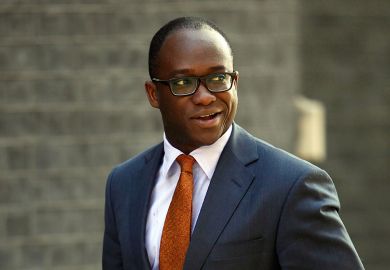Toby Young was rarely out of the headlines during the early part of the year. Hours after he’d announced his resignation from a controversial role as a director at the Office for Students, it emerged that he had been involved with a secret conference on eugenics and intelligence at UCL.
The conference had previously attracted speakers with white supremacist leanings and would be in breach of the government’s Prevent regulations on campus extremism. When UCL students found out about the conference and its proposed content, they gathered outside the university president’s office in protest.
The media attention surrounding Young’s resignation, and his links to the conference, threatened to overshadow one of the new regulator’s core proposals – to protect free speech at universities and fine institutions that stifle it through no-platforming and safe-space policies.
More on the 2018 Student Experience Survey
Student Experience Survey 2018: the results
Student Experience Survey 2018: methodology
Student Experience Survey 2018: Higher education sector still raises the bar in a turbulent year
Student Experience Survey 2018: Loughborough says its students’ ‘get-up-and-go’ attitude is the key to its success
Student Experience Survey 2018: Staffordshire’s 24-hour campus that works for all
Student Experience Survey 2018: Keeping mental health in mind
Student Experience Survey 2018: the rising stars of higher education
Student Experience Survey 2018: ‘At over £9K a year, is a degree worth it?’
The National Union of Students keeps its own “banned list” of people or groups holding racist or fascist views, including the British National Party and jihadist group Al-Muhajiroun, but how widespread are such policies across individual higher education institutions?
The NUS argues that no-platforming policies keep students safe, particularly in light of incidents on US campuses, where protests against appearances by right-wing provocateurs, such as Milo Yiannopoulos, have descended into violence.
In the UK, students’ unions have denied a stage to the feminist writer Julie Bindel because of her views on transgender people (University of Manchester), and gay rights activist Peter Tatchell (Canterbury Christ Church University), among many others. Some universities have been accused of banning certain newspapers, removing contentious books from libraries and creating lists of “trigger words” that should be avoided lest they cause offence.
Students themselves appear to crave the best of both worlds. Last year, a survey by the Higher Education Policy Institute found that 76 per cent of students expressed some support for no-platforming policies, yet 60 per cent felt that universities should never limit free speech.
“Many students are confused: they like free speech in theory but also appreciate trigger warnings and no platforming, and support the government’s Prevent strategy,” says Nick Hillman, Hepi’s director. He points out that the Office for Students’ proposals will put pressure on university governors to ensure that there is free speech on campus, but that guest invitations (or bans) tend to be extended by the students’ union rather than the university itself. “Often the union receives some funding from the university and it’s difficult for students not to be a member. We need to recognise wider institutional responsibility, which should cover the students’ union, too,” he adds.
Every year, online political magazine Spiked runs the Free Speech University Rankings, examining students’ union policies and ranking them using a traffic light system. The 2017 survey revealed that 63.5 per cent of universities were ranked “red”, meaning that they actively censor speech and expression, up from 55 per cent in 2016 and 41 per cent the year before. Almost a quarter of university administrations were ranked red, suggesting that it’s not just the unions that are forming policies around controversial speakers or materials.
Rankings coordinator Tom Slater believes that one of the concerns around censorship on campuses is that students’ union policies don’t always reflect the views of the wider student body. “Students’ unions are not fantastically representative of all students on campus – just look at the turnout for student rep elections: you’re lucky if it gets into double figures,” he says. “When they put forward a policy on what sort of fancy dress you can wear, for example, it’s as though the students aren’t capable of dealing with difficult issues or can’t take a joke.”
Adam Hagan, a second-year student at Sheffield Hallam University, argues that even unpalatable views need to be debated. “As a student, you’re supposed to explore ideas whether you agree with them or not,” he says. “It’s patronising to be told what I should think – let me make that choice. When we leave university, we’ll meet people who might be sexist or homophobic or whatever – surely it’s better to open our eyes to it now?”
Janet Beer, president of Universities UK and vice-chancellor of the University of Liverpool, argues that the Office for Students’ proposed sanctions do not mean there is a crisis in free speech. “What we need are good processes to ensure that people who take platforms are properly checked – we need to consider public order and safety implications, as well as the law, but we still need to promote the importance of free speech,” she says. She argues that there are already clear legal boundaries against, for example, inciting racial hatred. “If you drive contentious or different opinions underground, you have a negative effect. Denying these issues oxygen makes them more attractive,” she adds. “Unless something’s illegal, we shouldn’t strain every sinew to stop things from happening. We have to listen to things we disagree with sometimes, otherwise how are we supposed to form an opinion?”
Hillman agrees: “The law seems to draw the line in a relatively sensible place; you can’t promote violence, you can’t be racist. If you can’t have debate at the limits of free speech at a university campus, where can you have it?” In these days of social media “echo chambers”, universities’ role in free speech is more important than ever, he adds.
As Beer concludes, exposure to wide-ranging views is a fundamental element of the academic experience. “In my graduation speech for students, I always allude to the fact that they have come here to learn how to ‘disagree well’,” she says.
And while imposing financial sanctions on universities that place restrictions on certain speakers or materials may prove controversial, few would like to see a future where campus life is free from debate.
Register to continue
Why register?
- Registration is free and only takes a moment
- Once registered, you can read 3 articles a month
- Sign up for our newsletter
Subscribe
Or subscribe for unlimited access to:
- Unlimited access to news, views, insights & reviews
- Digital editions
- Digital access to THE’s university and college rankings analysis
Already registered or a current subscriber? Login










